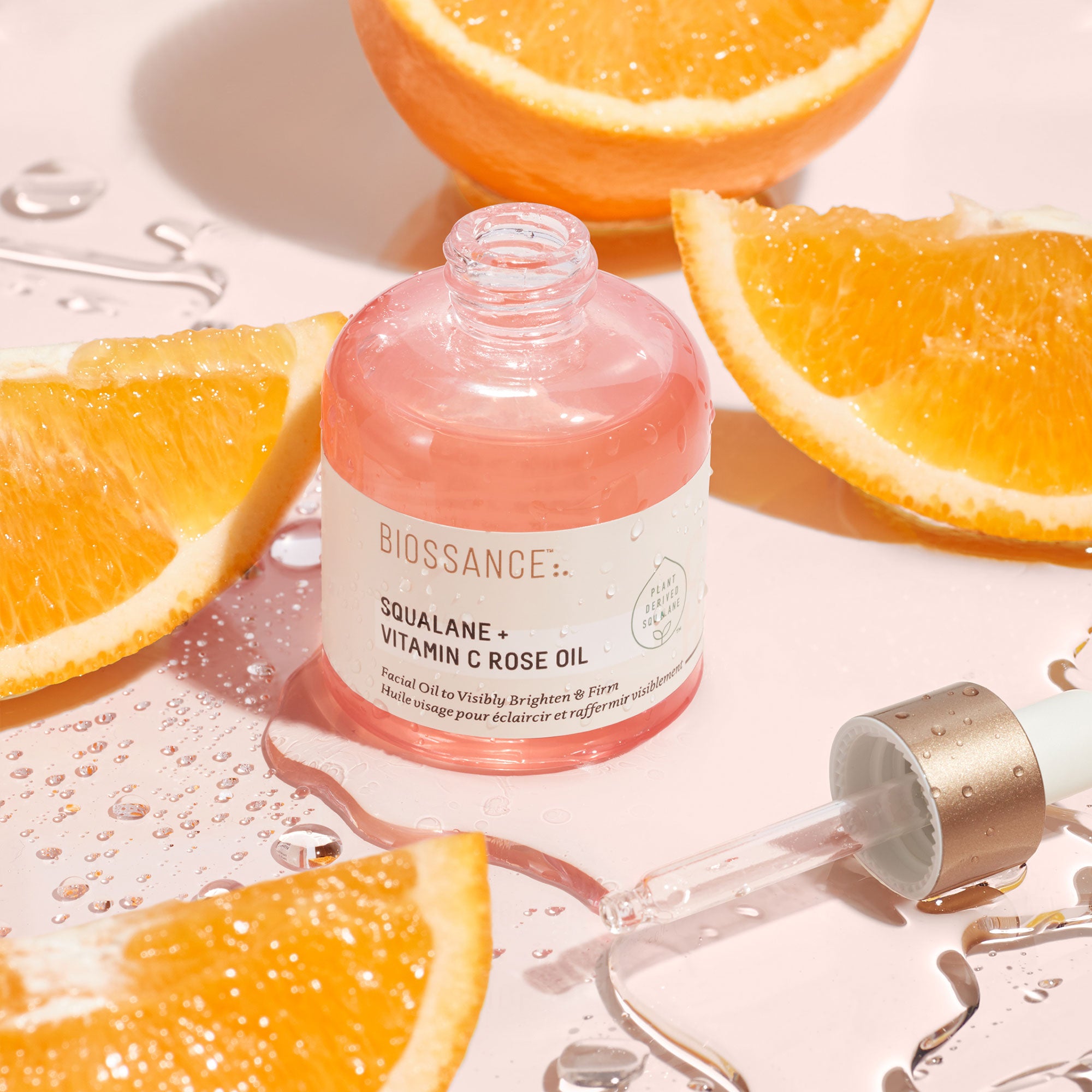Vitamin C, the antioxidant OG, is a powerhouse ingredient that is synonymous with brighter, even-toned skin. Most beauty aficionados will already have a good vitamin C product in their skincare routine. But is Vitamin C as good for your skin as everyone raves about? And what does Vitamin C do for your skin, precisely?
At Onda, we believe that Vitamin C is an essential tool in your skincare lineup, and dermatologists and scientists alike agree. Need convincing? Here’s what you need to know about Vitamin C, the antioxidant hero ingredient.
What is Vitamin C?
Vitamin C is naturally present in the skin but levels deplete as we age and after exposure to oxidant stress caused by pollutants and UV irradiation. While our bodies cannot produce additional Vitamin C and limits the amount ingested through diet available to the skin, the good news is that studies show that applying this ingredient topically delivers higher doses of Vitamin C into skin than ever can be achieved by diet and tops up your reserves of this crucial antioxidant1.
What does Vitamin C do for your skin?
When it comes to topical Vitamin C, the skincare benefits are multiple2: it acts as an antioxidant, protecting the skin from free radical damage, and fending off premature skin aging as a result of UV damage, which in turn can prevent the appearance of fine lines, wrinkles, and uneven texture. Vitamin C also reduces the appearance of dark spots and discoloration by blocking the overproduction of melanin and can help treat acne, thanks to its anti-inflammatory properties.
If that weren’t enough to convince you of this ingredient’s all-star rating, Vitamin C has been proven to stimulate collagen production, which can help to reduce the appearance of fine lines and wrinkles, and improve the overall tone and texture of the skin. It is also proven that, when in the sun, Vitamin C provides protection from harmful UV rays; but please note that it should never be used as a replacement for SPF. So, to the question “is Vitamin C good for your skin?”, the answer is a definite yes.
The different types of Vitamin C in skincare
There are several different types of Vitamin C used in skincare formulations. L-Ascorbic Acid is the most well-known and widely used and is often considered to be the most effective. Magnesium Ascorbyl Phosphate (MAP) and Sodium Ascorbyl Phosphate (SAP) are other forms of Vitamin C that you might see listed on your product’s ingredient lists, and while they are considered to be more stable than L-Ascorbic Acid, they are less potent.
The newest, hero form of Vitamin C is Tetrahexyldecyl Ascorbate, an oil-soluble vitamin C ester that is stable, non-irritating, and is absorbed into the skin faster and more easily. Because Tetrahexyldecyl Ascorbate has these qualities, it can also be used on sensitive skin and combined with a multitude of other ingredients including Retinol, although you should always trial and build up your skin tolerance to active ingredients.
How to use Vitamin C in your skincare routine
Vitamin C is mainly used in serums to ensure maximum stability and efficacy but it can also be found in cleansers, moisturizers, masks, and even sunscreens. Studies have shown Vitamin C to be most effective at concentrations ranging from 8% to 20%2, which is why serums are probably the best way to get your daily dose of this hero ingredient.
When and how often should you use a Vitamin C serum?
While safe for daily use, Vitamin C and its side effects on skin include irritation and increased sensitivity, especially if mixed with other acids such as AHAs or BHAs, though they can be used on the same day, just at different times: experts typically recommend using Vitamin C products in the morning and AHAs or Retinoids at night. Tetrahexyldecyl Ascorbate, on the other hand, has been found to be safe in concentrations up to 30%, even when used with Retinol.
According to studies3, Vitamin C is best used after exposure to UV light, so you can get additional benefits by incorporating it into your evening routine during the summer months in place of Retinol, which can increase sun sensitivity. Ingredients Vitamin C should be combined with include Niacinamide and Hyaluronic Acid to further boost their antioxidant and collagen-stimulating properties and to deliver a brighter, plumper complexion.
How to apply a Vitamin C serum properly?
As most Vitamin C products come in the form of serums, they should be applied onto cleansed skin and after your lotions and toners, but before heavier formulas such as face oils and creams. This allows the skin to better absorb Vitamin C and all its skincare benefits. Don’t forget to apply to your neck and décolleté as well as your face.
Here, some of our top Vitamin C serums.
